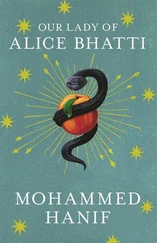“I’ll go with you if I can. If my dad gives me permission, count me in.”
Gloriosa glowered at Immaculée for having just betrayed her in front of the whole class.
“I’ve had enough of cruising around with my boyfriend on his bike,” said Immaculée. “I want something more exciting; then at least I’ll have something to tell him: I’ll be a girl who’s scared of nothing, I’ll be an adventurer!”
At the start of the January term, Goretti and Immaculée’s inevitable account of their adventures on Gorilla Mountain was eagerly awaited. The “explorers,” as Gloriosa mockingly referred to them, played the reluctant celebrities, saying little. “They got no farther than Ruhengeri,” jeered Gloriosa, “drinking Primus and eating grilled chicken while gazing at far-off Mount Muhabura in the clouds.” But one night after dinner, Goretti invited the whole class up to her room to hear the tale.
“So, did you see the gorillas?”
“You bet we saw them. We even touched them, or nearly. My father helped us, even though he’s very busy at the moment: there’s a lot of people who come see him at Ruhengeri military base; even Immaculée’s dad, who drove us to Ruhengeri, he needed to speak to my dad … So my father gave orders for us to be kitted out: a jeep, four soldiers, provisions. We wore camouflage gear, and the soldiers laughed so much when they saw Immaculée in high heels that they gave us these huge combat boots same as they’ve got: you’ll see in the photos.
“Anyway, we left at dawn, driving up the volcano in the jeep until we reached the forest. That’s where we were supposed to meet the guides, but they weren’t there. We spent ages waiting for them. The soldiers put two tents up: one for them, one for us. Finally, the head guide turned up, looking rather embarrassed. He said: ‘Madame, the white woman doesn’t want her gorillas disturbed. She says they don’t like Rwandans, that they’re frightened of them. They know it’s the Rwandans who kill them. It’s only whites who know how to handle them. That’s what my boss says. So I can’t take you there, or she’d fire me, and I don’t want to lose my pay: I can already imagine my wife yelling. I can’t stop you going any farther, but I won’t be your guide.’ He scampered off as fast as he could.
“We were heartbroken at the white woman’s forbidding us to visit our gorillas. Then one of the soldiers spoke to the sergeant. And the sergeant came and told us that maybe there was a way we could still go see our gorillas. The solider knew the Batwa, and where their camp was. If we gave them something, they would certainly agree to guide us to the gorillas. We got back in the jeep and drove deep into the forest, following the soldier. The Batwa fled when they saw us coming. But the soldiers caught an old fellow who couldn’t run as fast as the others. He was shaking, the poor old man. Immaculée and I tried to reassure him. I told him who I was and what we wanted. Luckily, I speak Kinyarwanda like they speak in Bukiga — you shouldn’t tease me about it so much. When at last the old guy understood we just wanted to see the gorillas, he called the others back and we started to negotiate. It took forever. But I am, after all, the daughter of the colonel who runs the military base. And there were the four soldiers clutching their rifles. We eventually made a deal. Two goats. One goat before we set off, which we entrusted to the women, and a second goat once they had taken us to the gorillas. We returned to our tents. The sergeant left in the jeep to go buy two goats at the nearest market.
“We slept in the tent, like real soldiers. The next morning, the Batwa were back. They asked:
“ ‘Where are the goats?’
“ ‘Look,’ said the sergeant.
“They examined them, and held a long discussion among themselves. The man who seemed to be the chief said he wanted to eat one straightaway, before taking us to the gorillas. The sergeant said it wasn’t possible, that he was expected back at camp the following morning, they must head off to see the gorillas right away. The Batwa were having none of it, they wanted to eat one of the goats before setting off, plus they’d told their women and children to go collect firewood. The sergeant said it was the colonel who had given orders to take his daughter up to the gorillas because she wanted to see them. The Mutwa turned to me and began laughing. ‘Now it’s black women too who want to see the gorillas!’ So I suggested that if they took us to see the gorillas immediately, I’d give them a third goat.
“ ‘Fine, we’ll go,’ the chief said finally. ‘I believe you really are the colonel’s daughter, but don’t forget, you’re the one who’s promised us a third goat. May lightning strike you down if we don’t get it!’
“We walked deeper into the forest. There was no trail. The Batwa hacked a way through for us with their machetes. ‘Paths,’ they said, ‘are for the Bazungu. Us, we’re sons of the forest. Can a mother lose her children?’ We walked for two hours, maybe three, I don’t recall. The Batwa forged ahead, without looking back to see if we were following. We stumbled at every step, branches and lianas whipping at our faces. Even the soldiers were anxious, scared that the Batwa were leading them into some kind of ambush.
“Suddenly, the Batwa chief crouched down and motioned that we should do the same. He made a strange sound with his lips, then picked up a little stem of bamboo that he waved as if in greeting. And there, through the trees, we spotted them: roughly a dozen gorillas, I didn’t count properly, with the biggest one, the head of the family, looking in our direction.
“ ‘Heads down,’ a Mutwa mumbled. ‘Don’t look at him, show him he’s boss, that you submit to him, I don’t think he likes your smell.’
“I buried my nose in the soil the way the Swahili of Nyamirambo do when they pray. The great gorilla stood and uttered a growl. He was absolutely huge. ‘It’s okay,’ said the Mutwa. ‘He recognized me, he’s satisfied, but don’t move.’
“Still, I raised my head, and had time to get a good look at them: the big boss still on his guard, the females, and the little ones. Immaculée, am I lying? Didn’t we see them really close up? Close enough to touch them.”
“Sure we saw them. The mommy gorillas sat in a circle while the head of the family kept an eye on us. The little ones played and frolicked in the middle, spinning round and round, went to suckle at their mother’s breast, got the fleas picked off them. The mommies chewed bamboo shoots for their young to eat, like our grandmothers did with sorghum. Then I thought about what Goretti’s mother said: that gorillas were once humans. Well, let me suggest a different story: gorillas refused to become humans; they were almost humans but they preferred to remain monkeys in their forest atop the volcanoes. When they saw that other monkeys like them had become humans, but had also become mean and cruel and spent their time killing each other, they refused to become humans. Maybe that’s the original sin Father Herménégilde is always talking about: when monkeys turned into men!”
“Immaculée, the philosopher!” sneered Gloriosa. “Miss Rwanda gets all theological! That’s hilarious. Now we’ve heard it all. You should put that in your next essay, Father Herménégilde will be fascinated!”
“And then,” Goretti continued, ignoring Gloriosa’s sarcasm, “the Batwa motioned that we should leave without a sound. They said that the large male was getting annoyed. I think they were also eager to go and eat their goats. We returned to the camp. The third goat was fetched, the Batwa composed a song in honor of the three goats, and we made our way back to the military base. The officers congratulated us for being so daring: it’s not just white women who are able to go visit the gorillas.”
Читать дальше












